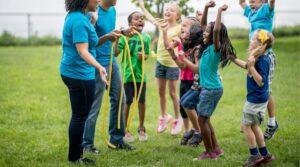Neurodevelopment refers to the growth and maturation of the nervous system during the early years of life, specifically between the ages of one and three. It involves the development of various cognitive, motor, language, and social-emotional skills that lay the foundation for future learning and overall development.
Children experience significant brain development from birth to age three, as neural connections form, strengthen, and optimize. The brain’s plasticity allows for learning and adaptation to the environment. Around this age, toddlers become more independent and curious, actively exploring their surroundings and engaging with others.
These are some of the key areas of neurodevelopment:
Cognitive Development
Toddlers’ cognitive abilities expand rapidly. They develop object permanence, the understanding that objects continue to exist even when out of sight. They also start to engage in symbolic play, using objects to represent something else. Toddlers begin to problem-solve, imitate others, and show an increased curiosity about the world around them.
Motor Development
Gross and fine motor skills continue to develop during the toddler years. Toddlers refine their walking and running skills, gaining more control over their movements. They develop the ability to climb stairs, kick a ball, and manipulate objects with increasing precision. Fine motor skills improve as toddlers learn to stack blocks, hold utensils, and engage in activities that require hand-eye coordination.
Language and Communication
Language development in toddlers is a remarkable process. They rapidly acquire new words, start combining words into simple sentences, and understand and follow basic instructions. Toddlers engage in simple conversations, express their needs and desires, and show an increasing understanding of language.
Social-Emotional Development
Toddlers begin to develop a sense of self and a growing awareness of others. They engage in parallel play, playing alongside other children without direct interaction. Social skills emerge as they learn to share, take turns, and show empathy. Emotional development involves the recognition and expression of emotions, as well as the beginning of self-regulation.
Nurture your child’s neurodevelopment from an early age
Every child is unique, and some may face specific challenges in their neurodevelopment. Recognizing and supporting neurodiversity ensures that every child receives the care and resources they need to thrive.
Sensory experiences, such as touch, sight, sound, taste, and smell, help shape a child’s developing brain. By providing a rich and varied environment that encourages exploration and sensory input, parents and caregivers can help enhance neural connections and promote cognitive growth.
These environments also encourage physical activity through opportunities for exploration and play that can enhance motor skills and coordination. Activities such as coloring, drawing, playing with clay or playdough, and using puzzles or open-ended toys allow for creativity and problem-solving, skills that contribute to various aspects of your child’s development.
Give your toddler healthy foods
Proper nutrition plays a vital role in supporting the healthy growth and development of a toddler’s brain. During the early years, the brain is rapidly developing, and it requires essential nutrients to fuel its growth and function optimally. Providing a well-balanced diet that includes a variety of nutrient-rich foods such as fruits, vegetables, whole grains, lean proteins, and healthy fats can contribute to optimal brain development.
On the other hand, poor nutrition, including a diet high in processed foods, sugar, and unhealthy fats, can negatively impact brain development. It may lead to deficiencies in essential nutrients and hinder the growth and functioning of the brain.
Social skills and interactions are important
Healthy and nurturing relationships are also fundamental to a child’s neurodevelopment. Responsive caregiving, characterized by consistent love, attention, and support, fosters secure attachments that create a safe base for a child to explore the world.
These strong emotional bonds provide the scaffolding for healthy brain development and lay the groundwork for social and emotional well-being. Arrange playdates or group activities where your toddler can interact with other children. These interactions promote language development, empathy, and social skills.
By embracing these principles, we create an environment where our children can flourish, grow, and reach their full potential.
The Value of Traditional Preschool Education: A Comparative Analysis
We believe in the power of hands-on, interactive learning experiences,...
Read moreEmbrace the Adventure: The Benefits of Sending Your Kids to Summer Camp
Embrace the Adventure! At Small Feat Preschool, we believe in...
Read moreUnderstanding Child Neurodevelopment in Toddlers
Children experience significant brain development from birth to age three,...
Read morePreparing Your Child for Pre-K: Essential Parenting Tips
To ensure a smooth transition, here are some essential parenting...
Read more




